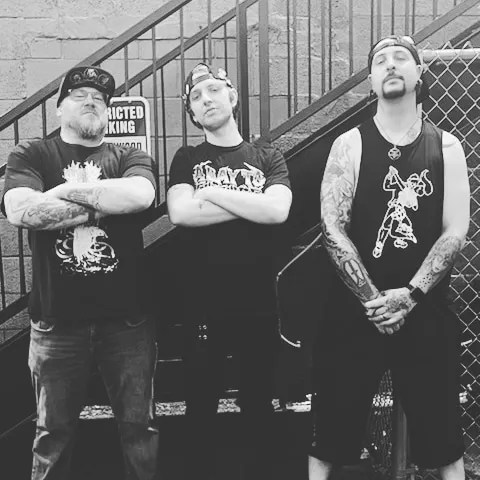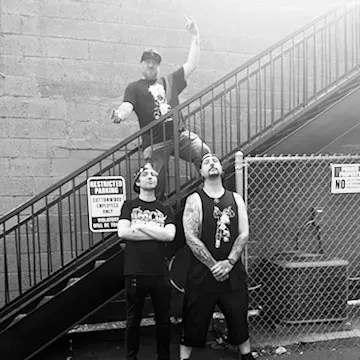
Drew Templeton

Audio By Carbonatix
Colorado-based musician Ryan Hatfield picked up a guitar at age fifteen after moving from Denver to Brighton, and he hasn’t put it down since. “I was a skateboarding kid, and when I moved to Brighton, there was no skateboarding, so I learned to play guitar,” he recalls.
Now 36, he’s moved all over the Denver metro area (he’s currently based in Thornton), earned his tenure in the Mile High punk scene and fronted several bands, including his latest endeavor, Fragile City.
But over the past year, he faced his biggest challenge yet: fentanyl addiction. Hatfield has been in recovery since May 2022, and is sharing his story in hopes of bringing more awareness not just to the perils of fentanyl, but to the life-saving resources available to others struggling with addiction.
Hatfield has been part of Colorado’s music scene since he was a teenager. At eighteen, he started the street-punk band Frontal Assault, which led to Three Grams Over an Ounce (now known as just Three Grams), a band heavily shaped by the politically charged music coming from the indie label Fat Wreck Chords. “We were really influenced by LeftÁ¶ver Crack, Suicide Machines, Anti-Flag. Most of my stuff I made in my late teens and twenties was political music, like anti-Nazi stuff or conspiracy stuff,” he says of his early discography. After eight years with Three Grams, Hatfield joined Denver pop-punk band The Larimers, but ultimately left after a few years because of tension between the band and his now ex-wife. “Then in 2017, I started another band called Filthy Hearts, and that was probably the most successful band that I’ve had, as far as listens on Spotify,” he says.
Filthy Hearts had plans to tour in 2020, which were of course derailed by the pandemic, so instead the band reunited later in 2020 to record an EP. “We went into the studio, and I had a really bad spate with what I thought was bipolar at the time,” he says. “I had to go to the mental hospital, and when I got out, I was like, ‘Okay, I have to get everything together. I gotta stop drinking, and I should probably put the band on hold until I can get that under control. The band was supportive and nice about it, but…it was taking too long for me to get in a good place, and they started their own band without me.”
The situation was exacerbated by more pressure from his then-wife to quit music altogether: “My ex-wife didn’t really like me playing music. She said it was bad for my mental health, but really, in the end, she was the thing that was bad for my mental health. It caused a lot of rifts in the Larimers and Filthy Hearts and Three Grams.”
After his time in the hospital, Hatfield successfully quit drinking, but then was introduced to a far more lethal substance: fentanyl. “Drinking had always been my biggest vice. I quit for like a year and a half, so when I was in the lull stage of that, I started hanging out with my downstairs neighbor, and he introduced me to fentanyl. I didn’t know it was fentanyl at the time. I thought they were oxys [oxycodone] because of all the counterfeit pills out there,” he says.
At the same time, around December 2021, his marriage was coming to an end: “When my ex-wife kicked me out, I moved in with the guy who introduced me to fentanyl. I got a job across the street working for a burger joint, and my fentanyl use was pretty low at that time. Around then, I figured out that I want to do music again, because I don’t have a reason not to.”
He made a Facebook post seeking other musicians, and connected with guitarist Jon Clemons and drummer Chad Howard to form a new band called Fragile City. But privately, his fentanyl use was escalating. “That same month I started working from home, and I started using fentanyl pretty regularly, almost every day when I got up. I was dealing with a lot of stuff mentally that I was trying to push to the side,” he discloses. “I was like, ‘I’m working from home, so no one will know if I’m high.’ January comes around, and I’m still working with Chad and Jon on these songs, but as the month progresses, I start using more and more, and I realize these aren’t oxys, like I thought they were.”

Hatfield (bottom left) has been in recovery since May 2022.
Drew Templeton
Several factors impacted the severity and acceleration of Hatfield’s addiction. None of his loved ones, or even his new bandmates, were aware of what was happening. “I’d only really hang out with my roommate, so no one knew what was going on,” he explains. “My folks don’t live in Denver; I don’t really have family here, so there were a lot of things going on that led me to get deeper into it.” Because of the shame and stigma around addiction, Hatfield didn’t feel comfortable confiding in anyone, either. “I was really ashamed of it,” he admits. “I had used drugs, but I’d never gotten addicted. I could kick pretty much anything, I thought. I quit alcohol, and that was my longest vice. So I really thought nothing would get me into trouble. We didn’t know the scale of counterfeit pills, and I slowly started finding stuff out.”
Although Hatfield had experimented with many other drugs before, including heroin, he had never experienced a feeling of chemical dependency before fentanyl. “By February, I’m reaching the peak of my using. I’m using every day. I have to use. I don’t feel good if I don’t use. I get dopesick. It’s getting more and more scary, and I’m realizing I’m addicted to this stuff,” he states. “I remember one night I smoked a bit of weed, and I had this huge realization that I can’t do anything without being on fentanyl pills – I can’t function, I’m not productive, and I don’t do anything other than get sick.”
By the time Fragile City started recording its debut EP, Hatfield could not go more than six hours without fentanyl: “I would have a set limit of time that I could be out in the world before I needed to get high. I had about six hours, if I used right before I left. But recording would take eight or nine hours, so I ended up having to bring it with me into the studio and use in the bathroom.” This pushed him to try and quit on his own, not knowing that fentanyl withdrawal can actually be fatal. “One night I was like, ‘I’m not going to take anything. I’m not going to smoke any fentanyl pills, and if it hurts, it hurts,'” he says of his first attempt at recovery. “I went thirteen hours without it, and it was the most painful thing that I’ve ever experienced. Throwing up, sweats, crazy stomachaches, every inch of your skin hurts, you can’t sleep. It was just horrible withdrawals.”
So Hatfield began to do more research about fentanyl addiction and discovered suboxone treatment. “I did a lot of research on fentanyl, and everything says you have to get some kind of medical help. I’m living in Denver at the time, and I’m looking up places where I can get on suboxone, because that seems to be the best option. Typically, if you’re a heroin addict or an opioid addict, you have to go into withdrawal to start suboxone. With fentanyl, you can’t do that, so what they do is microdosing,” he explains.
In May 2022, Hatfield began a doctor-monitored induction period, in which he would lower his fentanyl intake every day while increasing his suboxone dose. Within a week, he was completely off fentanyl and fully on suboxone (he believes this pace was possible because he never used fentanyl intravenously). “The last day, I had my last pill, and I feel this huge weight has been lifted from me. I haven’t been feeling [the fentanyl] for a few days, so I’m already more clearheaded and making more logical decisions. It’s been almost a year, and I haven’t touched it since,” he says triumphantly.
Although Fragile City didn’t play any gigs until after Hatfield was in suboxone treatment, the band’s self-titled debut EP was both written and recorded while he was still in the depths of fentanyl addiction. (Hatfield wrote three of the four tracks; “Night of the Living Dread” was written by Clemons.) Fragile City will play a show on Sunday, March 5, at Lost Lake.
“Music helped me get through it to some degree,” Hatfield notes. “It was the one normal thing that I had when I was using. It was the only thing outside of my drug circle. Music has been, and will always be, my lifeline.” On Fragile City, he isn’t shy about sharing his struggles with addiction. “Perseverance,” with lyrics like “This resolve is all I’ve got / Picked myself out of the mud,” could very well be the soundtrack to his sobriety journey.
“I don’t use drugs at all anymore,” he confirms. “I do have a relationship with alcohol, but I have rules around it. I don’t drink hard alcohol, because that usually leads to me seeking out drugs. The only thing I do on a regular basis is drink beer, and the only psychoactive thing I use is marijuana, occasionally.”
Hatfield, who has been completely opioid-free (including suboxone) since October 2022, now has a message for other people suffering from substance use disorders: “You have to make a decision on what you want your life to be like. Do you like dealing with dealers and other addicts? Is that enriching to your life? Or is it a hindrance to what you’re trying to do? My therapist says, ‘You have to change your people, places and things.’ You have to cut off ties with people that you were using with, because if you don’t, the chances of a relapse are very high.”
Hatfield, who no longer lives with the roommate who started him on fentanyl, is also speaking up about the lack of access to resources that were critical to his personal recovery, such as suboxone treatment and addiction therapists. “As much as everyone talks about the opioid epidemic, there needs to be more access to suboxone, especially for fentanyl users, because they can’t quit cold turkey, and most intravenous drug users can’t, either. Denver Health has a great program, but you have to live in Denver. There are Internet suboxone programs, but you have to have the proper insurance. People say, ‘Oh, we need to curb the opioid epidemic,’ but you don’t actually see access to these live-saving situations,” he emphasizes.
Ultimately, Hatfield wants other people dealing with addiction to know that there is hope. “I think it’s important to tell people that it’s not the end of your life if you’re hooked on this thing, because it can feel like that, especially as something that you cannot quit on your own. That makes you feel trapped,” he says. “And I felt trapped.”
Fragile City, with Elevated Sickness, Lamb-Bed and Violence in Violet, 4 p.m. Sunday, March 5, at Lost Lake, 3602 East Colfax Avenue. Tickets are $14 in advance or $17 day of show.